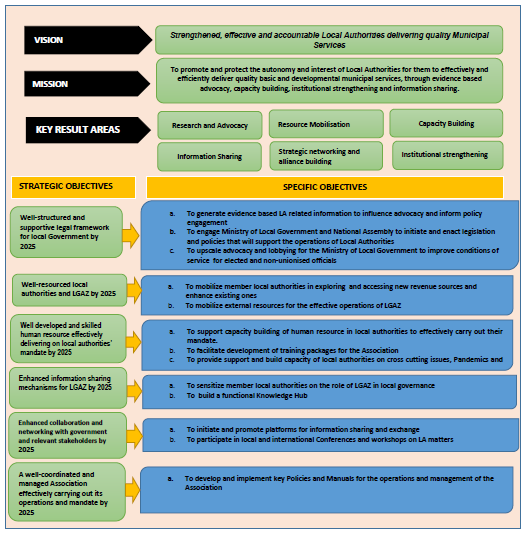Local Government Association of Zambia
The Local Government Association of Zambia was established in 1947 as the mouth-piece for local government authorities in the country. The Association’s principal objective has remained that of promoting and protecting the interests and autonomy of local government authorities. In recent times, the Association has played the role of facilitator of decentralization, sustainable development and local democracy.Other functions of the Association include capacity building to ensure institutional effectiveness of its member local authorities.
In pursuit of its lobby and advocacy as well as service provision role, therefore, the Association works in two directions: Firstly, towards central government by enabling local government to be heard, to be consulted and to be represented at that level.Secondly, towards its member local authorities by providing support and services as well as helping to build their capacities. The ultimate goal in both cases is to ensure that local authorities are effective in serving the needs of their citizens and working towards sustainable and equitable development.
Since 2000 it has been LGAZ's custom to develop strategic plans to guide its works at five-year intervals. Similarly, the 2021-2025 strategic plan has been systematically and objectively developed, with participation of selected local authorities and key stakeholders, by applying analytical and conceptual thinking.

0
People
Total People living
in Zambia
0
km²
Square kilometres
region covers
0
%
Zambia's literacy rate with illiteracy much more pronounced in females than males
0
%
Number of
Average Cost of livinglower than the USA

Our
Values
LGAZ is a non-profit making organization registered under the Societies Act, Cap. 119 of The Laws of Zambia.
Vision
"A Strong National Voice and Advocate for Local Government”
Mission
To protect and promote the interests and autonomy of local authorities in Zambia
Objectives
To promote the interests and autonomy of local government authorities in Zambia
The Secretariat
The Team
More About LGAZ
Activities
To organize seminars, workshops or courses on local government; To organize conferences and meetings.
Guiding Principles
Client Centeredness, Participatory, Working in Partnerships, Committed to Quality Performance, Unity in Diversity.
Membership
Membership of the Association is open to those who subscribe to the fundamental principles of democratic local self-government.
Full Membership
This is open, upon application, to all categories of local authorities in Zambia, concerned with the management.
Associate Membership
This is open, upon application, entities involved with local government affairs, provided they have common objectives with the association.
Honorary Membership
This is extended to persons who have rendered distinguished and conspicuous public service.
Governing Bodies
The governing bodies of the Association are the Annual Conference, the Executive Committee, Provincial Committees and the Presidency.
The Annual Conference
Is the supreme policy making organ of the Association comprising the President, Vice Presidents, Honorary Treasurer, Provincial Coordinators and representatives from all the local authorities.
The Executive Committee
Ensures implementation of the objectives, policies and decisions of LGAZ generally as directed by the Annual Conference.
The Presidency
comprises the President, Provincial Vice Presidents and Honorary Treasurer. The Presidency makes policy decisions between meetings of the Annual Conference.
The Provincial Committee
exercises powers assigned to it by the Annual Conference through the Executive Committee and deals with matters necessary in the smooth running of the Association at provincial level. Members.
Secretariat
The Annual Conference, Executive Committee and the Presidency are serviced by a full time secretariat comprising the Executive Secretary/CEO, Programme Officer, Information Officer, Finance and Accounts Officer.
Benefits
Being a member of the Association has the following benefits: Belonging to a countrywide network which is giving a voice and visibility to local government in Zambia; Having an opportunity to influence.
Finance
The Association derives its finances from membership fees, income from activities, grants, donations, loans etc. The fiscal year of the Association is January 1st to December 31st. The Executive Committee appoints.
Networks
The Association has established relations, links and networks with international organisations that pursue similar goals and objectives in developing and strengthening local self-government.
